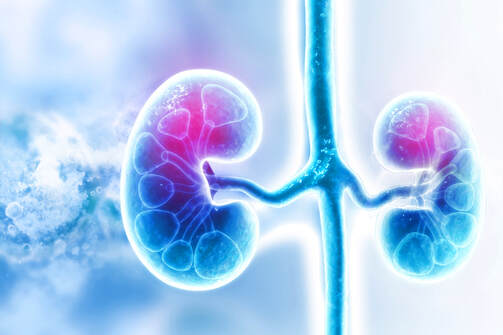 Kidney disease is a complex and chronic illness. It’s typically described in stages ranging from one to five, with five being kidney failure. The severity of an individual’s kidney disease is determined by assessing their glomerular filtration rate (GFR). GFR refers to the rate at which your kidneys filter toxins, and the five stages of kidney failure are described using GFR ranges. A healthy, young adult’s GFR is typically around 90-120 milliliters per minute (ml/min), but this rate gets increasingly slower as they age. Kidney disease, or an injury to the kidney, will cause their GFR to drop more rapidly than what’s typical of the natural aging process. Why Do Kidneys Fail?Diabetes and high blood pressure (also known as hypertension) account for 65% of chronic kidney disease cases, according to the CDC. This is because high blood pressure weakens the blood vessels and arteries that bring blood to the kidneys, making it hard for your kidneys to function properly. As a result of these weakened blood vessels, your kidneys may be unable to filter toxins out of your blood and body. Additionally, if you’re a smoker, you should quit. Smoking not only causes inflammation to your blood vessels, which puts you at an increased risk for heart attack or stroke, but it also puts you at a greater risk for chronic kidney disease. Stage 1 Chronic Kidney DiseaseStage one of chronic kidney disease (CKD) is a critical phase for your kidneys. Stage 1 chronic kidney disease symptoms don’t typically show up, but it’s crucial to discover kidney disease early for treatment to be as effective as possible. Stage 1 Chronic Kidney Disease SymptomsDuring stage one of CKD, you probably won’t notice many symptoms because your kidneys can remove most toxins from your body, even if they’re not 100% functional. In fact, many people with stage 1 kidney disease have what appears to be a healthy GFR of around 90 ml/min. However, you may still discover some symptoms through medical tests:
Can You Reverse Chronic Kidney Disease Stage 1?Sadly, there’s currently no complete cure for chronic kidney disease. However, by catching it early in stage 1, you may be able to significantly slow the progression of the disease with changes to your diet and lifestyle. Consult with a kidney doctor for more information about preventing the progression of stage 1 CKD. Stage 2 Chronic Kidney DiseaseDuring stage two of chronic kidney disease, your kidneys are still functioning fairly well. Therefore, like stage one CKD, it’s still uncommon for symptoms to present themselves. However, if you undergo blood tests, a lower GFR ranging between 60-89 ml/min may be more noticeable. High blood pressure and diabetes are known as ‘silent killers,’ as about a third of individuals with these diseases don’t even know they have them. If you’re at risk for either of these diseases, be sure to consult with your doctor or a nephrologist about your risk for CKD. Symptoms of Stage 2 Chronic Kidney DiseaseThe symptoms for stage two chronic kidney disease are effectively the same as stage one kidney disease:
Stage 3 Chronic Kidney DiseaseChronic kidney disease stage three is typically described with two phases: A and B. The GFR for stage 3A ranges from 45-59 ml/min, and the GFR for stage 3B ranges from 30-44 ml/min. At this point, the disease has progressed to a point where kidney function is significantly reduced, leading to increased levels of toxins in your blood. Stage 3 Chronic Kidney Disease SymptomsBy stage three of chronic kidney disease, symptoms will start to show. Common symptoms include:
Stage 4 Chronic Kidney DiseaseStage four of chronic kidney disease is marked by a GFR of 15-29 ml/min. At this point, your kidney function is severely limited, leading to increasingly complex health consequences if the appropriate actions aren’t taken. Symptoms of Stage 4 Chronic Kidney DiseaseStage four of chronic kidney disease brings an increased risk for other diseases like bone disease, heart disease, anemia, and other kidney-related life-altering symptoms. If you don’t have high blood pressure, you may be at risk for developing it by stage four of kidney disease. Symptoms may include any previously mentioned in stage three, as well as:
Stage 5 Chronic Kidney DiseaseFinally, chronic kidney disease will progress to stage five. At this point, the GFR—the kidneys’ ability to filter toxins out of your blood—has been reduced to 15 ml/min or less. Kidney function has declined so much at this point that medical interventions such as dialysis or kidney transplant are essential for surviving. Symptoms of Stage 5 Chronic Kidney DiseaseStage five kidney chronic kidney disease symptoms are as severe as you might expect. In addition to any of the symptoms from previous stages of kidney disease, individuals in stage five of kidney disease might experience:
End-Stage Renal DiseaseBeyond stage five chronic kidney disease is end-stage renal disease (ERSD), or kidney failure. At this point, the kidneys have failed and can no longer filter toxins out of your body or send nutrients to your other organs. When a patient suffers from ESRD, they must be put on dialysis or receive a kidney transplant to survive. Milwaukee Nephrologists is Here to Support Your Kidney HealthFor many people, chronic kidney disease can be extremely daunting. Because it’s difficult to detect early, the disease can progress by the time many individuals begin to notice symptoms. Combine that with the fact that it can’t be reversed, and you may be very concerned about your health.
The good news is that you don’t have to go through this health journey alone. Milwaukee Nephrologist’s team of kidney doctors are compassionate and experienced with all facets of kidney care and can help you develop a plan to protect your kidneys and your quality of life. Whether you’ve been diagnosed with chronic kidney disease or want to take proactive measures for your health, our team of specialists will be able to help you find the best treatment solutions. To learn more or schedule an appointment, contact Milwaukee Nephrologists today.
0 Comments
Your comment will be posted after it is approved.
Leave a Reply. |
